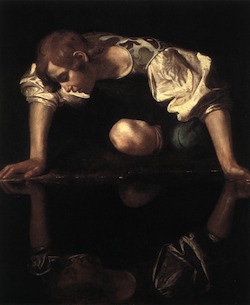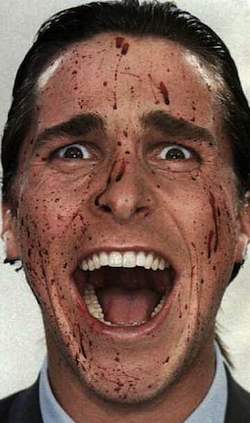
Meanwhile, psychologists are in an uproar over a decision to strike Narcissistic Personality Disorder from the diagnostic manual (DSM-5) of the American Psychiatric Association. The decision is hotly contested (see psychologist Gretchen Gibbs’ post at Zest of Orange) because the disorder has long been well-defined and the diagnosis useful in treatment.

Which brings me to fictional villains. Narcissists make terrific villains, especially in novels and films that explore revenge as a motive, in which a perceived slight arouses brutal retaliation. Some of us are tired of psychopathic serial killers and appreciate criminals with a more complex pathology.
Take Matt Damon’s role in the movie based upon Patricia Highsmith’s The Talented Mr. Ripley, in which the narcissistic sociopath Tom Ripley is scorned by a jet-setting crowd. He retaliates with a murder that leads to another and yet others as he charmingly and intelligently evades suspicion. With money and his “deserved” new status, he adopts the life of his first victim.
Also, consider the narcissistic mother in Janet Fitch‘s White Oleander, who kills a cheating boyfriend and—out of jealousy—manipulates her daughter’s adoptive mother into taking her own life.
It occurred to me that without a diagnosis of Narcissistic Behavior Disorder, authors might feel they need to choose a different set of traits to insure their villain’s motive comes across as genuine. But the behaviors won’t disappear along with the diagnosis. In their defense, the AMA has decided to lump narcissistic traits into the Anti-Social/Psychopathic bucket. Perhaps rightly so, because the characteristics of all these disorders occur on a continuum and overlap one another in many ways.

Who knows? If, as research suggests, narcissism is on the rise in America, we might find fictional characters with malignant narcissistic traits all the more compelling. With our next door neighbors revealing similar behavior, we’re all the more likely to believe in these fictional villains and their motives for murder.
Any thoughts on the AMA’s decision to trash Narcissistic Personality Disorder? Have a favorite narcissistic villain?
Image via Cold Climate Gardening.
Lois Karlin writes fiction and blogs at Women of Mystery. In the pursuit of authenticity she’s learned to dag sheep and take down a silo, and knows where to deep six a body in New York’s Hudson Valley.

Just tonight, CNN had a poll and conversation about why Americans are so rude to each other. Could the reason be those narcissistic traits you are talking about? Are we all just a few steps shy of murder?
He is my favourite actor – Christian Bale.
Terrie, if we’re not a few steps shy of actually doing the deed, it seems inevitable that we’ll come to accept it as commonplace. Most people already appear to find death and mutilation in war ho-hum reporting, so why not murder?
– Lois
You raise interesting questions, Lois. I think narcissists make very compelling, and sometimes terrifying, villains. One that comes to mind is the Jessica Walters’ character in “Play Misty for Me.” I didn’t love the film, but Walter was very convincing.
Want to thank you for this great post!!
I definitely enjoied every bit of it, I have you bookmarked to check out new stuff you post.
Meanwhile, check out this free classified ads site: anunturili.ro